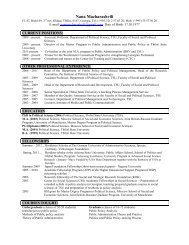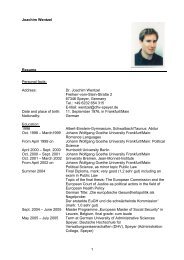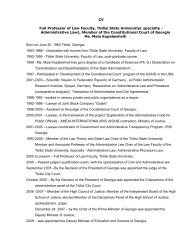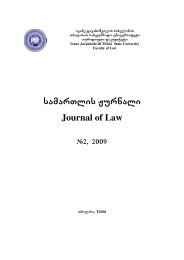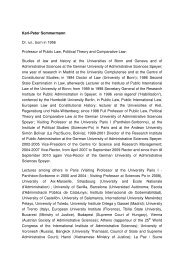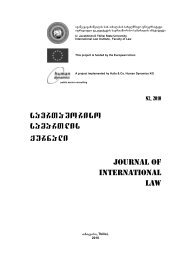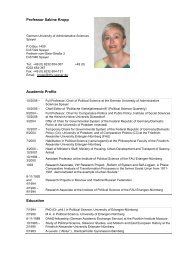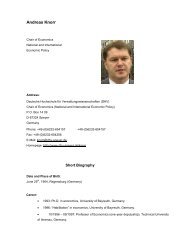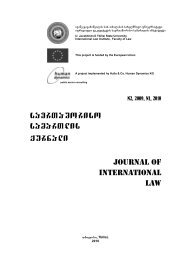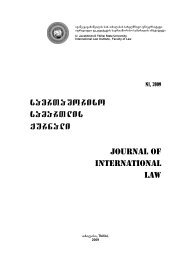Untitled
Untitled
Untitled
You also want an ePaper? Increase the reach of your titles
YUMPU automatically turns print PDFs into web optimized ePapers that Google loves.
I. GIVIASVILI, INTERNATIONAL LEGAL ASSESSMENT OF THE RECENT STEPTS TAKEN BY THE RUSSIAN...<br />
sian Federation is a permanent member of the<br />
Council, and thus, its affirmative vote is also<br />
required for taking a decision, reaching the<br />
tengable result is unrealistic.<br />
3.5 The Internaitonal Court of<br />
Justice (ICJ)<br />
Georgia may apply to the International<br />
Court of Justice claiming the violation of the<br />
Article 2(4) of the United Nations Charter and<br />
request the Russian Federation to be a respondent<br />
party to a case. However, the Russian<br />
Federation does not belong to the group<br />
of States, which have recognized automatic<br />
jurisdiction of the ICY under Art. 36 of the ICY<br />
Statute. Based on this there is a need that the<br />
Russian Federation recognizes the jurisdiction<br />
of the ICY in relation to any given case in order<br />
for the ICY to exercise its jurisdiction.<br />
It must be mentioned that the Advisory<br />
Opinion of the ICY, which can be requested<br />
by the General Assembly or the Security Council,<br />
may be sought. A written request shall be<br />
submitted to the ICY to that end. Hawever The<br />
Advisory Opinion does not have a legally binding<br />
force.<br />
3.6 International Criminal Court (ICC)<br />
The 1998 Rome Statute of the International<br />
Criminal Court 17 represents an international<br />
legal mechanism, which the international community<br />
shall employ for bringing to justice perpetrators<br />
of the crimes. Georgia, after signing<br />
the Statute, ratified it and thus is a State-<br />
Party to it. According to the Article 12 of the<br />
Statute, a State which becomes a Party to the<br />
Statute thereby accepts the jurisdiction of the<br />
Court with respect to the following most serious<br />
crimes: a) Genocide, b) Crimes against<br />
humanity, c) War crimes, d) the crime of aggression.<br />
The Russian Federation has also<br />
signed the Statute, however it has not ratified<br />
the document yet. In accordance with the Article<br />
18 of the 1969 Vienna Convention on the<br />
Law of Treaties, a State is obliged to refrain<br />
from acts which would defeat the object and<br />
purpose of a treaty when it has signed the<br />
treaty, but not ratified it.<br />
Georgia may claim that the Russian Federation<br />
violated Article 18 of the Vienna Convention.<br />
4. INTERNATIONAL LEGAL CONSEQUENCES<br />
DERIVING FROM THE RECOGNITION OF<br />
KOSOVO FOR GEORGIA<br />
A number of international commentators<br />
have lately evaluated the recognition of Kosovo<br />
as a creation of the precedent establishing the<br />
superiority of the principle of self-determination<br />
over the principle of the territorial integrity<br />
of a State. It was also suggested that the<br />
recognition of Kosovo would have involved the<br />
same approach with regard to other unrecognized<br />
subjects throughout the world and a new<br />
reality would have emerged resulting in the<br />
devaluing the principle of territorial integrity.<br />
Respectively, in order to assess the validity<br />
of such opinions, international legal assessment<br />
shall be made with regard to the threats<br />
for Georgia stemming from the recognition of<br />
Kosovo.<br />
Kosovo has for years been a topic of political<br />
confrontation between the Government<br />
of Serbia and ethnic Albanians living in Kosovo.<br />
In 1999 the United Nations Security Council<br />
adopted the Resolution 1244. 18 The Resolution<br />
establishes the temporary presence of<br />
the United Nations and regulates the administration<br />
by the international civil and security<br />
presence. Starting from 1999, based on the<br />
mentioned Resolution, Kosovo is administered<br />
by the interim UN Administration in Kosovo<br />
(hereinafter – UNMIK).<br />
In 2001, based on the Resolution 1244<br />
the UNMIK created Constitutional Framework<br />
for Kosovo, based on which the provisional<br />
institutes of self-government (PISG), including<br />
the elective assembly, as well as the posts<br />
of the President and the Prime Minister, established.<br />
Based on the very same Resolution,<br />
the United Nations assisted in interim administration<br />
of Kosovo by the peace-keeping so<br />
called Kosovo Forces (KFOR) operating under<br />
the NATO aegis. It must be underlined that<br />
the Resolution 1244 recognizes the territorial<br />
integrity and sovereignty of then still Federal<br />
Republic of Yugoslavia (whose successor state<br />
is considered to be Serbia). Despite the fact<br />
that the Resolution 1244 does not recognize<br />
independence of Kosovo, it does not grant any<br />
role to Serbia in Kosovo administration. Imprimis<br />
it must be stated that declaring that the<br />
very recognition of Kosovo will bring about the<br />
new reality and this will confirm the fact that<br />
219



